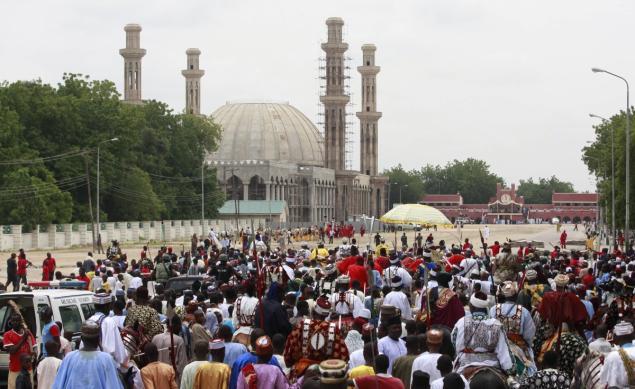Boko Haram Fears Cancel I`itikaf in Nigeria

"For security reasons, we have decided to cancel the I'itikaaf (seclusion) this year. You will recall that just last week, it was by Allah's grace that many people escaped being massacred here by a female suicide bomber," Muhammad Abdullah, a scholar at a mosque on Zaria Road Kano, told Onislam.net.
He confirmed that similar steps are being taken across other major mosques "purely for security reasons."
"We pray to Allah to return peace to our land and destroy all the elements who are waging this violence. As Muslims, we will continue to pray to Allah to grant us victory over the evil people behind the violence."
At the Ibn Khattab mosque in Kano, a female suicide bomber attempted to blow up worshipers last week but was repelled by vigilant members of the Muslim community. She ended up killing herself and injuring a few others.
Suicide bombers have targeted at least three mosques in the northern region since Ramadan started. The bloodiest was the last Sunday suicide blast in north central Jos town where 44 people were confirmed killed in a mosque and a nearby restaurant.
The Kano branch of the Nasrul-Lahi-L-Fatih Society (NASFAT), one of the biggest Islamic organizations in Nigeria and West Africa, has announced cancellation of its open-field annual Night of Power prayer in the regiom, citing security concerns.
"Due to security situation in the state, our supposed Laylatul Qadr has been cancelled (this year). May Allah be with us," the organisation said in a terse statement to the public.
No I`itikaf
OnIslam.net has gathered that major mosques in Kaduna in the northwest, Borno and Yobe in the northeast and Abuja in the country's capital have all called off I'itikaaf program this year for fear of security breaches arising from Boko Haram activities.
"I usually do my I'itikaaf at Sultan Bello Mosque here in Kaduna but we have been notified that the program will not be holding this year because of the menace of Boko Haram," Ahmed Ladan, a civil servant, told OnIslam.net.
"Other mosques are following the same practice because there is fear that Boko Haram militants may use the opportunity to target worshippers."
Sheikh Muhammad Khalid, the Chief Imam of Apo Legislative Quarters in the Nigerian capital Abuja, had announced a few days ago that the I'itikaaf will not be holding at the grand mosque which hosts hundreds of Muslims every year.
"Everyone can testify to the fact that insecurity is becoming widespread; bombings have become the order of the day in the North, especially in the North Eastern part of the country," the country's news agency NAN quoted him as saying.
"We need to join hands with government to do whatever we can possibly do in our capability to tackle it headlong. However, it is a very difficult task to tackle because of the faceless nature of the Boko Haram members that have been terrorizing Nigeria."
Prayer for Country
The Jama'atu Nasril Islam (JNI), one of the country's apex Muslim bodies, has called for intense prayers in the last 10 days of the holy month, condemning the spate of violent attacks by the Boko Haram militants in the northern region.
"We reiterate our call to the Muslim faithful to intensify prayers for the Ummah against all manners of upheavals, particularly special prayers (Al-Qunuut) be offered for the affected states," JNI spokesman Dr Khalid Aliyu Abubakar said in a statement made available to OnIslam.net.
"We use this medium to once again condemn in the strongest terms the recent attack unleashed on innocent civil servants undergoing screening at the Sabon Gari Local Government Secretariat, Zaria in Kaduna State.
"May Allah, the King, the Holy, the One free from all defects, the Giver of security, the Watcher over his creatures, the Almighty, the Compeller, the Supreme, deal appropriately with whoever sheds the blood of innocent Muslims and other Nigerian citizens and bring to shame and disgrace, whoever they are and wherever they may be. Whatsoever is the perpetrators motive, may it not be actualized, Aameen."
Regardless, the Muslim body also called on the believers to use the last 10 to read more of the Holy Qur'an, search for the night of majesty and to give alms to the poor.
The statement added: "Taking into cognizance the importance of the last ten days of Ramadan, as highlighted by the Prophet (PBUH), Nigerian Muslims are called upon to maximally put to use these last ten days in reciting more of the Glorious Quran, being punctual in observing the daily obligatory prayers in congregation and are also urged to punctually observe Tahajjud.
"They are also implored to intensify their generosities in giving alms to the poor, the needy, the orphans and the handicapped in the society, especially that many families are just living hand to mouth.
"More importantly, they should watch out for Laylatul Qadr (the Night of Power) which often comes up in one of the five exceptional nights, according to authentic Ahadith of Prophet Muhammad (SAW) as earlier stated."
Source: OnIslam



